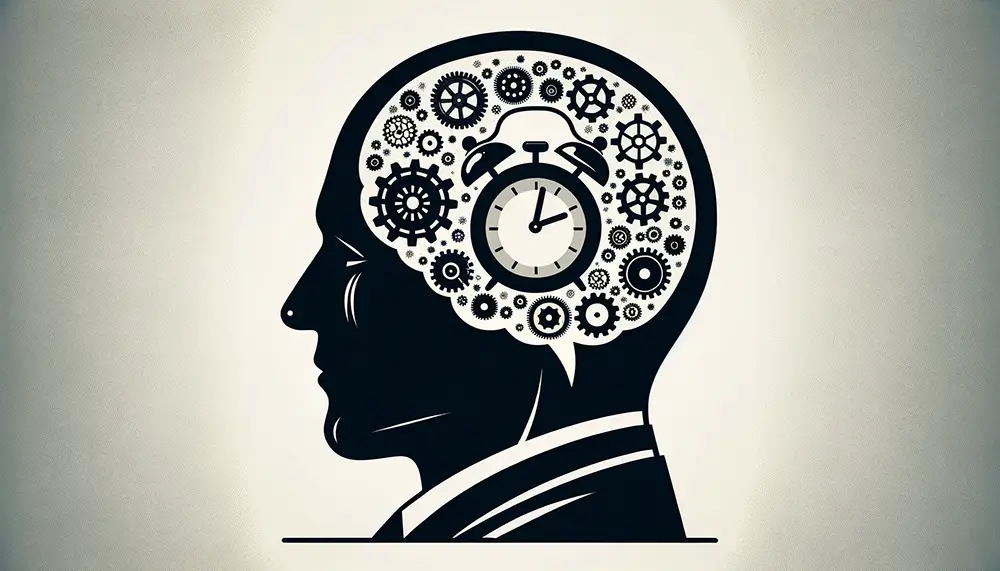Introduction
Procrastination, often simplified as the act of delaying or postponing tasks, is a complex phenomenon that affects many individuals across various aspects of life. Understanding why we procrastinate and how it impacts our productivity and well-being is crucial for personal and professional development.

Section 1: The Psychology Behind Procrastination
Why Do We Procrastinate?
At its core, procrastination is more than just delaying tasks; it’s a complex behavior tied to our psychological state. The fear of failure looms large, causing many to put off tasks in a bid to avoid potential disappointment. This fear is particularly potent when we’re faced with tasks that push us out of our comfort zones or challenge our abilities.

Perfectionism plays a significant role as well. The pursuit of flawless results can be paralyzing, leading to a complete avoidance of tasks. This is often because the pressure to perform at an exceptionally high level creates an overwhelming sense of dread.
Moreover, when tasks seem overwhelming or mundane, the immediate allure of more enjoyable activities can be irresistible. The human brain is wired to prefer immediate rewards, making procrastination a common response to tasks that don’t offer instant gratification.
The Role of Emotions in Procrastination
Emotions are at the heart of why we procrastinate. Anxiety and boredom are particularly influential, making the initiation or continuation of tasks daunting. The emotional discomfort associated with certain tasks drives us towards activities that offer relief, albeit temporary.
The cycle of procrastination is often fueled by the quest for instant gratification. Choosing immediate pleasure over long-term gains is a natural impulse, but it reinforces procrastinatory behaviors, making it a challenging cycle to break.
Procrastination and Personality Types
Not everyone is equally prone to procrastination; personality plays a pivotal role. Impulsiveness is a key trait among chronic procrastinators. The desire for immediate rewards overshadows the importance of future benefits, leading to procrastination.
Perfectionists, despite their best intentions, often fall into the procrastination trap. The immense pressure they put on themselves to achieve perfection can make starting tasks seem insurmountable, as the fear of producing anything less than perfect takes over.
Understanding the Impact of Procrastination
The consequences of procrastination extend beyond missed deadlines. Chronic procrastination can lead to significant stress, reduced productivity, and a decline in mental health. Recent studies suggest that nearly 20% of adults experience procrastination that significantly impacts their lives, highlighting the need for effective strategies to combat this pervasive issue.
Strategies to Overcome Procrastination
Combatting procrastination requires a multifaceted approach. Setting small, achievable goals can make tasks seem more manageable, reducing the urge to delay. Additionally, developing a better understanding of one’s emotional triggers can help in creating strategies to address the root causes of procrastination.
Mindfulness and time management techniques have shown promise in helping individuals stay focused and reduce procrastination. By fostering a greater awareness of the present moment, mindfulness can help break the cycle of avoidance and improve one’s ability to tackle tasks head-on.
In conclusion, understanding the psychological underpinnings of procrastination is crucial for developing effective strategies to overcome it. By addressing the emotional and personality-related aspects of procrastination, individuals can take meaningful steps towards enhancing their productivity and well-being.
Section 2: The Impact of Procrastination

On Productivity and Performance
Procrastination is a significant barrier to maintaining high productivity and performance levels. When tasks are delayed, the work often becomes rushed, leading to missed deadlines and lower quality outcomes. A 2019 study revealed that over 40% of employees admit that procrastination has led to a decrease in their productivity. This cycle of procrastination followed by panic not only affects work output but also leads to increased stress levels, ultimately impacting overall work and life satisfaction.
Mental and Emotional Effects
The repercussions of chronic procrastination extend far beyond mere productivity challenges; they deeply affect an individual’s mental health. Procrastination is strongly linked with heightened stress, anxiety, and even depression. The guilt and feelings of inadequacy that follow the postponement of tasks can erode self-esteem over time. According to a 2020 survey, individuals who identify as chronic procrastinators reported higher levels of stress and lower well-being than their non-procrastinating counterparts.
Long-Term Consequences
The long-term consequences of habitual procrastination can be profound. Strained relationships, both personal and professional, often result from the inability to meet commitments and responsibilities. Career progression can be stymied by a reputation for unreliability or poor performance, leading to missed opportunities and potential job loss. Furthermore, the continuous stress associated with procrastination can contribute to various health issues, such as heart disease and high blood pressure, exacerbating the negative impacts on an individual’s life.
Breaking the Cycle
To mitigate the detrimental effects of procrastination, it is essential to adopt proactive strategies. Time management skills, such as prioritizing tasks and breaking them down into smaller, more manageable parts, can significantly alleviate the overwhelming feeling that often leads to procrastination. Additionally, mindfulness and stress-reduction techniques can help individuals manage the emotional aspects of procrastination, promoting a more balanced and healthy approach to task management.
Creating a Supportive Environment
The environment plays a crucial role in influencing procrastination habits. Creating a workspace that minimizes distractions and encourages focus can make a substantial difference. Moreover, building a supportive network that offers encouragement and accountability can help individuals stay on track and combat procrastination effectively.
In conclusion, understanding the multifaceted impact of procrastination on productivity, mental health, and long-term well-being is critical. By recognizing the signs and implementing strategies to counter procrastination, individuals can improve their performance, enhance their emotional well-being, and achieve greater success in their personal and professional lives.
Section 3: Procrastination from a Health Perspective
Physical Health Correlates
The indirect impact of procrastination on physical health is often overlooked, yet it is significant. The stress that comes with delaying tasks can lead to a range of physical health issues. Sleep disturbances are one of the most common consequences, with procrastinators frequently reporting poorer sleep quality due to stress and anxiety over unfinished tasks. This, in turn, can lead to weakened immune function, making the body more susceptible to infections and illnesses.
Furthermore, chronic stress, a common byproduct of procrastination, is a known risk factor for cardiovascular diseases. Elevated stress levels can lead to increased blood pressure and heart rate, putting additional strain on the heart. A 2018 study linked high levels of procrastination with poor heart health, emphasizing the need to address procrastination not just for mental well-being but for physical health as well.

The Stress-Procrastination Cycle
The interplay between stress and procrastination forms a vicious cycle that can be challenging to break. Stress often leads individuals to procrastinate as a way of coping with immediate emotional discomfort. However, this short-term relief leads to increased stress levels as deadlines approach and tasks pile up, perpetuating the cycle.
Understanding this cycle is essential for developing effective strategies to interrupt it. Stress management techniques such as deep breathing, meditation, and physical exercise can help reduce the immediate feelings of stress, making it easier to tackle procrastination head-on. Additionally, adopting a more proactive approach to task management, such as breaking tasks into smaller, more manageable steps, can reduce the overwhelm that often leads to procrastination.
Promoting Healthier Lifestyle Choices
Breaking the stress-procrastination cycle can lead to healthier lifestyle choices. By managing stress more effectively and reducing procrastination, individuals can improve their sleep patterns, boost their immune function, and lower their risk for stress-related health issues. It’s about creating a positive feedback loop where better health facilitates reduced stress, which in turn, decreases the tendency to procrastinate.
Addressing procrastination is not only beneficial for improving productivity and mental well-being but is also crucial for maintaining good physical health. By understanding the health implications of procrastination and the stress-procrastination cycle, individuals can take steps towards healthier lifestyle choices and better overall health. Breaking free from the cycle of procrastination can lead to significant improvements in both well-being and quality of life.
Section 4: Understanding and Overcoming Perfectionism
The Perfectionism-Procrastination Link
Perfectionism is often seen as a positive trait, equated with striving for excellence. However, it can be a double-edged sword, especially when it leads to procrastination. The fear of not meeting exceedingly high standards can paralyze individuals, preventing them from starting tasks altogether. This fear is rooted in a deep-seated anxiety about failure or making mistakes, leading to a cycle where nothing gets done because it might not be done perfectly.
Research indicates that perfectionists tend to procrastinate more than non-perfectionists, suggesting a direct link between the desire for perfection and the tendency to delay tasks. Recognizing this connection is crucial for addressing the underlying issues that fuel procrastination.

Strategies to Combat Perfectionism
Adopting a Growth Mindset
One effective strategy against perfectionism is adopting a growth mindset. This involves understanding that skills and abilities can be developed through dedication and hard work. Viewing challenges as opportunities to learn, rather than as threats to one’s inherent abilities, can significantly reduce the fear of failure.
Setting Realistic Goals
Perfectionists often set unattainably high goals, setting themselves up for disappointment. Setting realistic and achievable goals can alleviate the pressure to perform perfectly, making it easier to start and complete tasks. Breaking larger projects into smaller, manageable tasks can also help in making progress without the overwhelming need for perfection in every aspect.
Embracing Imperfections
Learning to embrace imperfections is another vital step in overcoming perfectionism. Mistakes should be viewed as learning opportunities rather than failures. This shift in perspective can reduce the fear of starting tasks and can foster a more forgiving and compassionate approach to one’s work and self-expectations.
Practicing Self-Compassion
Self-compassion involves treating oneself with the same kindness and understanding one would offer to a good friend. For perfectionists, practicing self-compassion can be particularly challenging but also incredibly rewarding. It involves recognizing that being imperfect is part of the human experience and that making mistakes does not diminish one’s worth.
Perfectionism can significantly contribute to procrastination, but by understanding this link and adopting strategies to combat perfectionism, individuals can improve their productivity and well-being. Embracing a growth mindset, setting realistic goals, accepting imperfections, and practicing self-compassion can all play a part in breaking the cycle of perfectionism-driven procrastination.
Section 5: Building Self-Discipline and Motivation
Techniques for Enhancing Self-Discipline
Self-discipline is the cornerstone of overcoming procrastination. It’s the ability to push oneself to start and complete tasks even when you don’t feel like it. Building self-discipline doesn’t happen overnight, but with consistent effort, it’s definitely achievable.

Setting Clear, Achievable Goals
Goals give direction and purpose. Setting clear, achievable goals provides a roadmap to follow, making it less likely to veer off course. It’s important to set goals that are specific, measurable, attainable, relevant, and time-bound (SMART). This clarity reduces ambiguity, which often leads to procrastination.
Establishing a Structured Routine
A structured routine can significantly enhance self-discipline. By setting specific times for work, exercise, and leisure, you create a predictable environment that fosters productivity. Routine reduces the need for decision-making about what to do next, which can be a major procrastination trigger.
Minimizing Distractions
In today’s digital age, distractions are everywhere. Minimizing distractions is crucial for maintaining focus. This might mean turning off notifications on your phone, using apps that block distracting websites, or creating a dedicated workspace that’s free from interruptions.
Finding and Sustaining Motivation
Motivation can wax and wane, but there are strategies to keep it consistent and strong. Understanding what drives you and how to harness that energy is key to maintaining momentum.
Identifying Personal Motivators
Understanding what motivates you on a deep level can provide a powerful push to get things done. Whether it’s the desire for personal growth, the satisfaction of completing tasks, or external rewards, recognizing your personal motivators can help sustain effort over time.
Using Positive Reinforcement
Positive reinforcement is a powerful tool for building and sustaining motivation. Rewarding yourself for completing tasks, no matter how small, reinforces the behavior you want to continue. This could be as simple as taking a short break, enjoying a favorite snack, or watching an episode of a beloved show.
Breaking Tasks into Smaller Parts
Large tasks can be overwhelming, leading to procrastination. Breaking tasks into smaller, more manageable parts makes them less daunting and more approachable. This strategy also provides more opportunities for small victories, which can boost morale and motivation.
Celebrating Small Victories
Recognition of progress, no matter how small, is vital. Celebrating small victories provides a sense of accomplishment and encourages continued effort. It’s a reminder that every step forward is a step in the right direction.
Building self-discipline and finding sustained motivation are crucial for overcoming procrastination. By setting clear goals, establishing routines, minimizing distractions, and leveraging personal motivators, you can enhance your ability to stay focused and productive. Remember, progress, not perfection, is the goal. Celebrating each small victory along the way can make the journey towards greater self-discipline and motivation both rewarding and effective.
Section 6: Practical Solutions and Tools to Beat Procrastination
Time Management Strategies
Managing time effectively is a key strategy in the battle against procrastination. By organizing and prioritizing tasks, you can make the most of your productive hours and minimize the urge to delay.
The Pomodoro Technique
The Pomodoro Technique is a popular time management method that breaks work into short, focused intervals, typically 25 minutes in length, separated by brief breaks. This technique helps maintain high levels of concentration while providing regular rest periods, making large tasks seem more manageable and less daunting.
Task Prioritization
Prioritizing tasks based on their urgency and importance can help focus efforts on what truly matters. The Eisenhower Box, a simple decision-making tool, can be particularly useful in categorizing tasks into four quadrants based on their urgency and importance, helping to decide which tasks to do immediately, schedule for later, delegate, or eliminate.
Leveraging Technology and Resources
In the digital age, technology offers a plethora of tools designed to enhance productivity and combat procrastination.
Productivity Apps
There are numerous apps designed to boost productivity, such as Trello for task management, Forest for maintaining focus, and RescueTime for tracking time spent on various activities. These tools can help you stay on track by providing insights into your work habits and offering mechanisms to keep you focused.

Progress Tracking Tools
Keeping track of progress can be incredibly motivating. Apps that allow you to set goals and visualize your progress, like Habitica or Asana, can make the journey towards completing tasks more engaging and rewarding.
Creating a Supportive Environment
The environment in which you work can have a significant impact on your propensity to procrastinate. Creating an environment that fosters productivity is crucial.
Accountability Partners
Having someone to hold you accountable can greatly enhance your commitment to tasks. Whether it’s a colleague, friend, or family member, an accountability partner can provide the external motivation needed to stay on track.
Optimizing Your Workspace
Your physical workspace can either enhance or detract from your ability to focus. Creating a clutter-free, organized, and pleasant work environment can reduce distractions and make it easier to get into a productive workflow.
Combating procrastination requires a multifaceted approach that includes effective time management, leveraging technology, and creating a supportive environment. By employing techniques like the Pomodoro Technique, utilizing productivity apps, and ensuring a conducive workspace, you can significantly reduce the tendency to procrastinate and enhance your overall productivity. Remember, the key is to find the strategies that work best for you and to apply them consistently.
Empowering Yourself to Overcome Procrastination
Overcoming procrastination is not just about improving time management; it’s about empowering yourself to make significant changes in your life. By understanding the psychological factors that contribute to procrastination and implementing practical strategies, you can break free from its hold. This empowerment leads to a domino effect, enhancing productivity, boosting well-being, and improving overall quality of life.
The journey to overcoming procrastination is deeply personal and requires a commitment to self-improvement. It involves facing fears, challenging ingrained habits, and stepping out of comfort zones. But the rewards are immense, offering not just short-term gains in productivity but long-term benefits to mental and emotional health.
Embracing Change and Growth
Change is at the heart of overcoming procrastination. It’s about evolving your approach to work, managing your emotions more effectively, and adopting a mindset geared towards growth. This growth mindset enables you to see challenges as opportunities, mistakes as learning experiences, and tasks as steps towards achieving your goals.
The Role of Self-Compassion
Self-compassion is a critical component of this journey. Being kind to yourself, acknowledging your efforts, and forgiving yourself for past procrastinations are key to moving forward. This compassionate approach fosters a healthier relationship with work and with yourself, making it easier to tackle tasks proactively.
Tips and Tricks Sidebar
- Break tasks into smaller, more manageable parts to reduce overwhelm and make progress more achievable.
- Set clear, achievable goals and deadlines to provide direction and a sense of urgency.
- Use positive reinforcement to celebrate progress, no matter how small, to keep motivation high.
- Establish a structured routine to minimize decision fatigue and create a productive rhythm to your day.
- Practice mindfulness to stay present and focused, reducing the likelihood of drifting into procrastination.
Dos and Don’ts Sidebar
- Do set realistic expectations for tasks and outcomes to avoid the trap of perfectionism.
- Do use time management techniques to structure your day effectively, making the most of your productive hours.
- Don’t let perfectionism hinder your progress; embrace imperfections and view challenges as learning opportunities.
- Don’t underestimate the power of taking regular breaks to recharge mentally and physically, enhancing your overall productivity.
In conclusion, overcoming procrastination is about more than just “getting things done.” It’s a transformative process that leads to personal growth, improved mental health, and a more fulfilling life. By adopting the right strategies, maintaining a growth mindset, and practicing self-compassion, you can empower yourself to break the cycle of procrastination and achieve your true potential.
Frequently Asked Questions
Q1: What are the main causes of procrastination?
A1: The main causes of procrastination include fear of failure, perfectionism, lack of motivation, overwhelming tasks, and poor time management. Emotional responses such as anxiety or boredom can also play a significant role in leading individuals to procrastinate.
Q2: How does procrastination affect mental health?
A2: Procrastination can have negative effects on mental health, leading to increased stress, anxiety, and feelings of guilt or inadequacy. Over time, chronic procrastination can contribute to the development of depression and lower self-esteem.
Q3: Can procrastination be a sign of underlying psychological issues?
A3: Yes, procrastination can sometimes be a sign of underlying psychological issues such as anxiety disorders, depression, or ADHD. It’s important to address these underlying conditions to effectively manage procrastination.
Q4: What are some effective strategies to overcome procrastination?
A4: Effective strategies to overcome procrastination include setting clear and achievable goals, breaking tasks into smaller parts, establishing a structured routine, using time management techniques, and practicing mindfulness. Adopting a growth mindset and practicing self-compassion are also beneficial.
Q5: How can technology help in combating procrastination?
A5: Technology can aid in combating procrastination through various productivity apps and tools that help manage time, track progress, and maintain focus. Examples include task management apps, focus timers, and progress tracking tools.
Q6: Is it possible to completely eliminate procrastination?
A6: While it may be challenging to completely eliminate procrastination, it is possible to significantly reduce its impact through consistent application of effective strategies and techniques. Understanding personal triggers and addressing them can also help in managing procrastination more effectively.































































Thank you for taking the time to read our article on understanding and overcoming procrastination. We truly appreciate your engagement and hope you found the insights shared both helpful and informative.
If you noticed any inaccuracies or have any queries, please don’t hesitate to let us know in the comments below. Your feedback is invaluable to us and helps us improve.
Moreover, we’re always on the lookout for fresh ideas and perspectives. If you have any suggestions or topics you’d like us to explore in future articles, please share them with us. Your input is a crucial part of our journey to provide content that resonates with and benefits our readers.
Once again, thank you for your support and engagement. We’re here to assist you in your personal and professional growth journey, and we look forward to continuing this journey together.